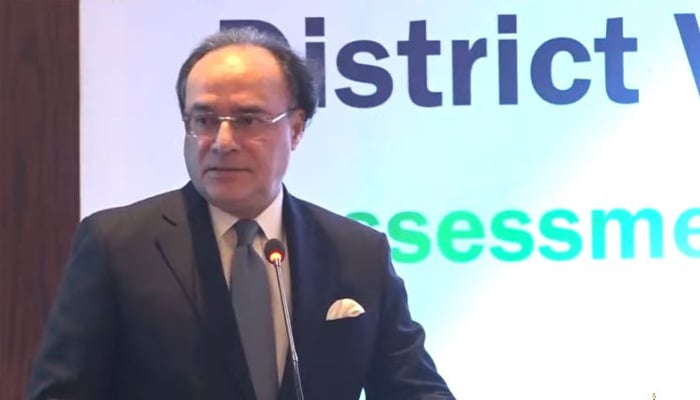
- FinMin addresses district vulnerability index for ceremony in Pakistan.
- Climate change exposes communities to extreme conditions: FinMin.
- Minister highlights the need to recognize the link between population and climate.
Federal Minister for Finance and Revenue Senator Muhammad Aurangzeb on Monday said Pakistan’s long-term economic prospects were inseparably linked to how effectively the country confronted the twin national challenges of rapid population growth and growing climate vulnerability.
He expressed these views while addressing the launching ceremony of District Vulnerability Index for Pakistan (DVIP), organized by the Population Council here.
The minister noted that while the country continued its trajectory towards macroeconomic stabilization and growth, Pakistan could not achieve its full potential without addressing the pressures created by demographic momentum and growing climate risks.
He highlighted that the impacts of high population growth were reflected in persistent human development challenges, including child stunting, learning poverty and a workforce insufficiently equipped for the future.
At the same time, Aurangzeb said, climate change continued to expose communities to extreme temperatures, flooding, drought and environmental degradation, with the most severe effects falling on districts already struggling with poverty, weak infrastructure and limited access to essential services.
The Minister of Finance affirmed the ministry’s commitment to supporting national efforts in formulating population and climate-related policies by integrating these priorities into budgeting and resource allocation.
He underlined the growing role of finance ministries globally in incorporating climate and demographic considerations, reinforcing that Pakistan must adopt the same approach to ensure long-term resilience and equitable development.
The minister praised the Population Council for producing a comprehensive, data-driven District Vulnerability Index based on three years of research.
He emphasized that the Index provides actionable management insights through its detailed analysis across six domains, offering meaningful insights into geographical disparities and identifying the most at-risk districts, particularly in Balochistan and Sindh.
The findings reflect how social vulnerabilities and climate exposure reinforce each other, creating compounding risks for already marginalized populations.
It also drew attention to the growing trend of rural-urban migration and the expansion of informal settlements, where inadequate water, sanitation and hygiene conditions contribute to poor nutritional outcomes and perpetuate child stunting.
He encouraged more research on urban vulnerabilities so that national planning can address the full spectrum of demographic and climate-related challenges.
Minister Aurangzeb highlighted the need to recognize the interdependence between demographic dynamics and climate impacts and called for the integration of vulnerability metrics in future frameworks for resource allocation.
He highlighted that incorporating this knowledge into national planning will be essential to ensure equity, strengthen resilience and direct support to the districts that need it most.
The Minister appreciated the support of development partners, particularly the UK Government and the FCDO, for their continued assistance in governance reforms, revenue mobilization and evidence-based policy formulation.
He expressed confidence that the District Vulnerability Index will serve as an important tool to guide future national strategies and thanked the organizers and contributors for their efforts.



